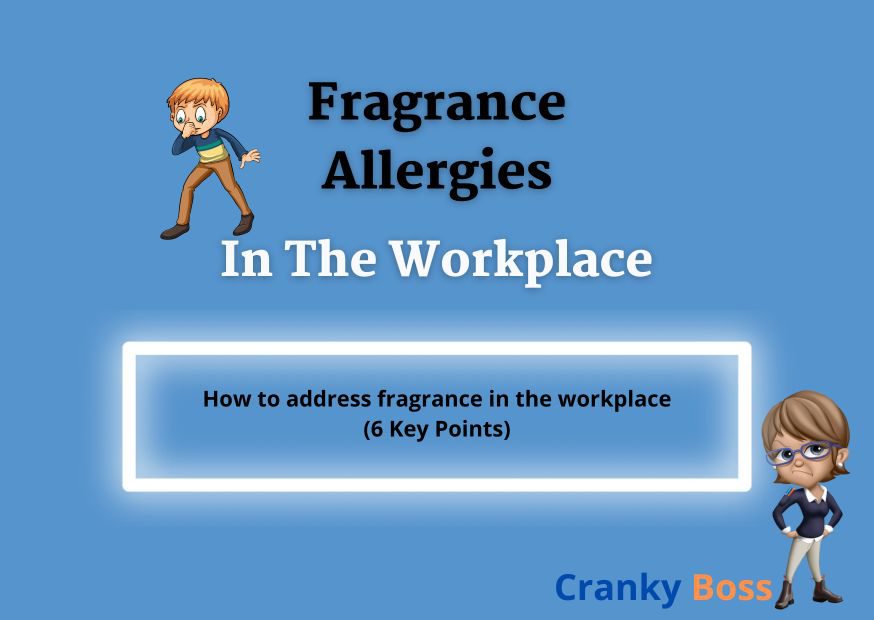Fragrance allergies in the workplace are a significant issue that affects many people. When individuals have allergies to fragrances, it means that certain scented products can trigger allergic reactions in them. These reactions can range from mild discomfort to severe health problems, making it crucial for employers and employees to be aware of and address this concern effectively.

Understanding Fragrance Allergies in the Workplace
For employees with fragrance allergies, the symptoms can be diverse. These may include respiratory issues like coughing, sneezing, and difficulty breathing. Skin reactions such as rashes and hives are also common, along with headaches and nausea. In severe cases, exposure to certain fragrances can lead to anaphylaxis, a life-threatening allergic reaction that requires immediate medical attention.
Challenges and Symptoms of Fragrance Allergies
One of the main challenges with fragrance allergies is that they can be triggered by various sources. These can include perfumes, colognes, air fresheners, and scented cleaning products. Even seemingly harmless scents, such as those from personal care items like lotions and soaps, can cause allergic reactions in sensitive individuals. This makes it difficult to completely eliminate all potential triggers from the workplace environment.
How Do You Address Fragrance in the Workplace?
Addressing fragrance in the workplace involves several strategies. Employers can start by implementing a fragrance-free policy that encourages employees to refrain from using scented products while at work. Additionally, promoting open communication and understanding among employees can help create a supportive environment for those with fragrance sensitivities. Let’s take a further look at these below:
What Can You Do About Fragrance Sensitivity in the Workplace?
1. Employer Responsibilities and Policies
Employers have a responsibility to create a safe and inclusive work environment for all employees, including those with fragrance allergies. This involves implementing policies and practices that minimize the risk of exposure to triggering scents. One approach is to establish a fragrance-free workplace policy. In this instance employees are asked to refrain from using scented products while at work.
Perfume in the Workplace Policy
A perfume in the workplace policy outlines guidelines and expectations regarding fragrance use. This may include specifying which scented products are allowed or prohibited, providing alternatives to scented cleaning products, and establishing designated fragrance-free areas within the workplace.
Can My Employer Stop Me from Wearing Perfume?
In most cases, employers can establish policies regarding fragrance use in the workplace. These policies are often aimed at creating a comfortable and safe environment for all employees, including those with fragrance allergies. It’s important for employees to understand and comply with such policies to promote a harmonious workplace.
2. Effective Communication Strategies
Communication plays a crucial role in addressing fragrance allergies in the workplace. Employers should educate their staff about the impact of fragrances on allergic individuals and the importance of accommodating their needs. This includes providing alternatives to scented products, such as fragrance-free cleaning supplies and personal care items.
Furthermore, employers can encourage open dialogue between employees to promote understanding and support. Creating a culture of respect and empathy can make a significant difference in how fragrance allergies are perceived and managed in the workplace.
How to tell your coworker/employee:
Telling another employee that their perfume is causing an issue can be a delicate situation that requires sensitivity and tact. Here are some steps an employee can take to address this issue respectfully:
Choose the Right Time and Place
Find a private and appropriate moment to have the conversation, preferably away from other coworkers to avoid embarrassment or discomfort.
Start with a Positive Note
Begin the conversation on a positive note by complimenting something about the person, such as their work or a recent accomplishment. This helps to create a friendly and non-confrontational atmosphere. Be careful that its not a backhand compliment though.
Be Honest and Direct
Clearly explain that you have a sensitivity to certain fragrances and that their perfume is causing discomfort for you. Use “I” statements to express how the scent affects you personally without sounding accusatory.
An “I” statement is a communication technique that focuses on expressing your feelings, thoughts, or beliefs without blaming or accusing others. Here’s an example of an “I” statement related to fragrance sensitivity:
“I’ve noticed that I have a sensitivity to strong perfumes, and when I’m exposed to them, I tend to experience headaches and discomfort. It would really help me out if we could find a way to minimize the use of strong scents in our shared workspace.”
Offer Solutions
Suggest possible solutions or compromises, such as using less perfume or opting for a fragrance-free alternative while at work. Assure them that you understand it’s a personal choice but that finding a middle ground would greatly help alleviate the issue.
Be Respectful and Understanding
Approach the conversation with empathy and understanding. Acknowledge that everyone has different preferences and sensitivities, and the goal is to find a mutually beneficial solution that respects everyone’s comfort.
Follow Up
After the initial conversation, follow up to see if there have been any changes or if further adjustments are needed. Express gratitude for their understanding and willingness to work together on the issue.
By approaching the conversation with empathy, honesty, and a focus on finding a solution together, employees can effectively address perfume-related issues in a respectful manner. Emotional intelligence in the workplace is often key when communicating.
3. Physical Changes to Reduce Exposure
In addition to policy implementation and communication strategies, employers can also make physical changes to the workplace environment to reduce the risk of exposure to fragrances. This may include improving ventilation systems to filter out airborne irritants, using natural cleaning products that are less likely to contain strong scents, and providing designated fragrance-free areas for sensitive individuals.
4. Accommodations for Fragrance Allergies
It’s essential for employers to work closely with employees who have fragrance allergies to accommodate their needs effectively. This may involve making reasonable accommodations, such as allowing telecommuting or adjusting work schedules to minimize exposure during peak fragrance times.
5. Training and Education
Training and education are key components of addressing fragrance allergies in the workplace. Employers should provide training sessions on fragrance allergies, their symptoms, and how to respond in case of an allergic reaction. This empowers employees to recognize potential triggers and take appropriate actions to ensure their safety and the safety of their colleagues.
6. Staying Informed and Compliant
Furthermore, employers should stay informed about relevant regulations and guidelines regarding fragrance allergies in the workplace. By staying compliant with legal requirements and industry standards, employers can mitigate risks and create a healthier work environment for everyone.
Conclusion
Creating Safe and Inclusive Workplaces
Fragrance allergies in the workplace are a significant concern that requires proactive measures from employers and employees alike. By implementing fragrance-free policies, promoting open communication and understanding, making physical adjustments to the work environment, providing training and education, and staying informed about regulations, workplaces can become safer and more inclusive for individuals with fragrance allergies.
I have always been sensitive to smells, especially perfumes and cleaning products. Whenever I encounter even mild fragrances, it tends to trigger a headache for me, making it challenging to be comfortable in that environment. I remember not being able to sanitise my hands during covid due to the scented sanitisers stores had for customers. At work it was always the cleaning products that I was triggered with.
It’s important for employers and coworkers to be considerate of individuals with fragrance sensitivities to ensure a comfortable and inclusive workplace for everyone.
Being a leader not a boss, coupled with ‘togetherness’ is what creates environments where everyone can thrive without compromising their health and well-being.

